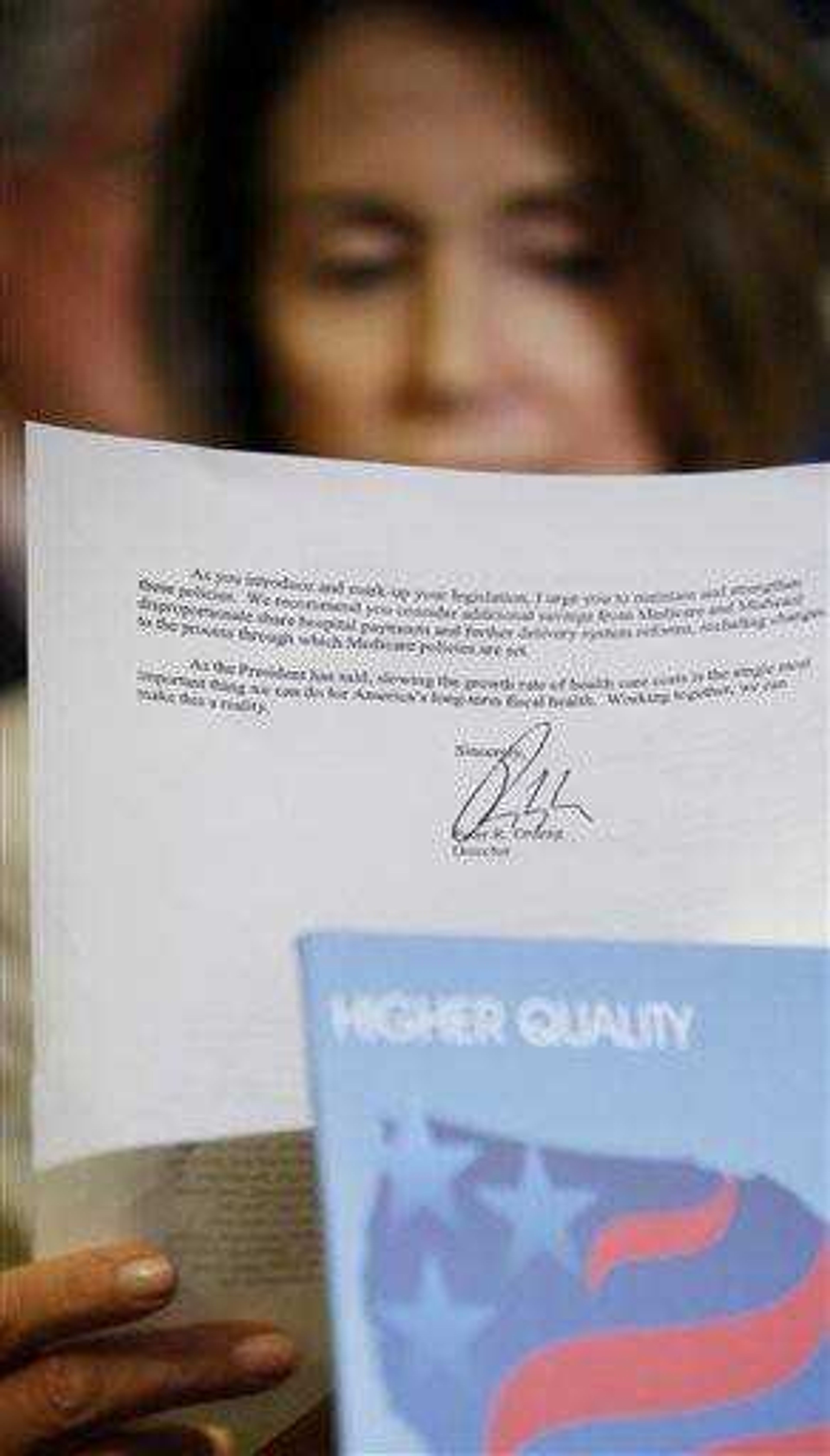AP sources: Senators near bipartisan health deal
WASHINGTON -- A bipartisan group of senators is closing in on a health care compromise that omits key Democratic priorities but seeks to hold down costs, as lawmakers on both sides of the Capitol struggled Tuesday to deliver sweeping health legislation to President Barack Obama...
WASHINGTON -- A bipartisan group of senators is closing in on a health care compromise that omits key Democratic priorities but seeks to hold down costs, as lawmakers on both sides of the Capitol struggled Tuesday to deliver sweeping health legislation to President Barack Obama.
In the House, Democratic leaders continued to negotiate with conservative and moderate rank-and-file party members with time running out for a vote before lawmakers leave Friday for a monthlong vacation.
The fiscally conservative Blue Dogs were at odds with the leadership over how to pay providers in a government-run health plan that would compete with private insurance. The House bill models the payments based on Medicare, but the so-called Blue Dogs want a negotiated rate similar to private insurance. Other issues remain sticking points for the Democrats.
"We're not ready to support a bill yet," said Rep. Baron Hill, D-Ind., a member of the Blue Dog group, who added: "We'll get there. We are going to pass a health care bill, whether it's now or in the fall remains to be seen."
Without the backing of the 52-member Blue Dogs, it would be difficult for Democratic leaders to pass a bill, especially since no Republican supports the legislation.
"I think there's still a bit of daylight between the positions," said Rep. Earl Pomeroy, D-N.D. "I think the bottom line of Blue Dogs has not been met as of this time."
Democratic leaders are still holding out hope of floor passage before the summer break, and Majority Leader Steny Hoyer is looking at keeping the House in session some days past its scheduled Friday adjournment date.
After weeks of secretive talks, three Democrats and three Republicans on the Senate Finance Committee were edging closer to a compromise that excludes a requirement many congressional Democrats seek for large businesses to offer coverage to their workers. Nor would there be a provision for a government insurance option, despite Obama's support for such a plan, officials said.
The Finance senators were considering a tax of as much as 35 percent on very high-cost insurance policies, part of an attempt to rein in rapid escalation of costs. Also likely to be included in any deal was creation of a commission charged with slowing the growth of Medicare.
"We're going to get agreement here," Sen. Max Baucus, D-Mont., the Finance Committee chairman, said Monday. "The group of six really wants to get to 'yes.'"
Obama has outlined two broad goals for legislation he is struggling to win from Congress: expansion of health insurance coverage to millions who lack it, and reining in increases in costs. The president is participating in an AARP town-hall meeting on health care Tuesday.
The president's top domestic priority has suffered numerous setbacks in recent weeks and a Senate vote has been postponed until September. Administration and Democratic leaders hope to show significant progress before lawmakers begin their monthlong August recess.
In the House, seven fiscally conservative House Democrats who have held up action in the Energy and Commerce Committee by demanding more cost savings and other changes negotiated late into the night Monday with the committee's chairman, Rep. Henry Waxman, D-Calif. Waxman's is the only one of three House panels with jurisdiction on the health bill that has yet to act.
The Blue Dogs have enough votes in the Energy and Commerce Committee to potentially block passage there, but time is running out for their negotiations with Waxman. A voting session in Waxman's committee that has been on hold for a week must resume quickly, probably by Wednesday at latest, if there's any chance for the committee to pass a bill and send it to the full House for action before the summer recess.
In the Senate, officials stressed that no agreement has been reached on a bipartisan measure, and said there is no guarantee of one, with numerous key issues remaining to be settled.
The officials spoke on condition of anonymity, saying they were not authorized to discuss matters under private negotiations.
They said any legislation that emerges from the talks is expected to provide for a nonprofit cooperative to sell insurance in competition with private industry, rather than giving the federal government a role in the marketplace.
Obama and numerous Democrats in Congress have called for a government option to provide competition to private companies and hold down costs, and the House bill includes one -- another concern for the Blue Dogs.
Officials also said a bipartisan compromise in the Senate would not subject large companies to a penalty if they declined to offer coverage to their workers. Instead, these businesses would be required to reimburse the government for part or all of any federal subsidies designed to help lower-income employees obtain insurance on their own.
The legislation in the House includes both a penalty and a requirement for large companies to share in the cost of covering employees.
___
Associated Press writer Ricardo Alonso-Zaldivar contributed to this report.
Connect with the Southeast Missourian Newsroom:
For corrections to this story or other insights for the editor, click here. To submit a letter to the editor, click here. To learn about the Southeast Missourian’s AI Policy, click here.










